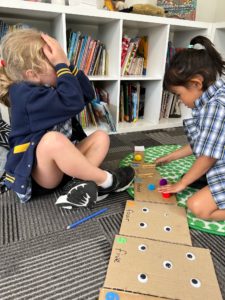At Waverley Meadows, mathematics is taught according to the Victorian Curriculum. Problem solving approaches are embedded throughout each unit of work. We are well resourced with mathematics equipment, both at the whole school and classroom level, enabling a hands-on approach.
Mathematics is separated into the dimensions of:
Students participate in daily mathematics lessons that follow a sequence in order to build on skills already mastered. Guiding principles for all maths lessons are:
At Waverley Meadows we aim to ensure our students:
Flexible groupings are carried out to cater for point-of-need teaching and learning within modules. All teachers build strong relationships with all students in their module to ensure that differentiation through maths lessons provides for all of our learners.
Intervention and extension are provided through our personalised learning approach, catering for the individual child. Pre and post testing of student abilities at the start and end of each unit ensures that student needs are being met. Data is collected and student growth is tracked.
Digital technologies are utilised to support maths programs through online learning platforms such as Mathletics, essential assessments and challenging maths games.

